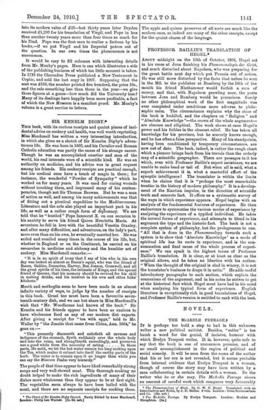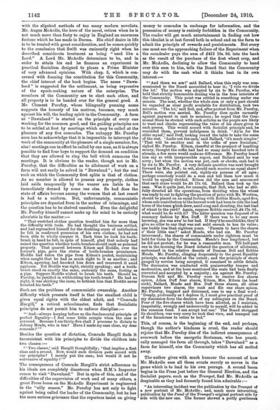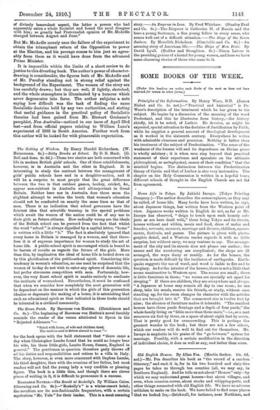NOVELS.
THE McARDLE PEERAGE.f
IT is perhaps too bold a step to hail in this unknown writer a new political satirist. Besides, "satire" is too harsh a word for the genial, if incisive, humour with which Evelyn Tempest writes. It is, however, quite safe to say that the book is one of uncommon promise, and of no small accomplishment in the region of political and social comedy. It will be seen from the name of the author that his or her sex is not revealed, but it seems probable from internal evidence that Evelyn Tempest is a woman, though of course the story may have been written by a man collaborating in certain details with a woman. Be the writer who he or she may, The MeArdle Peerage shows an amount of careful work which compares very favourably • The Phenomenology of Mind. By G. W. F. Hegel. Translated, with an Introduction and Notes, by J. I). Baillie 2 vols. London : Swan Sonneuschein and Co. [21s. net.1 t The MeArdle Peerage. By Evelyn Tempest. London: Hodder and Stoughton. [6s.]
with the slipshod methods of too many modern novelists. Mr. Angus McArdle, the hero of the novel, retires when he is not much more than forty to enjoy in England an enormous fortune which he has made in Burma. His chief desire in life is to be treated with great consideration, and he comes quickly to the conclusion that Swift was eminently right when he described considerate treatment as being " used like a Lord." A Lord Mr. McArdle determines to be, and in order to attain his end he finances an experiment in practical Socialism designed to please a Prime Minister of very advanced opinions. With chap. 5, which is con- cerned with framing the constitution for this Community, the chief interest of the book begins. The name " Dawn- land " is suggested for the settlement, as being expressive of the epoch-making nature of the enterprise. The members of the Community are to elect each other, and all property is to be handed over for the general good. A Mr. Clement Purefoy, whose bilingually punning name suggests the honesty of his motives, becomes, very much against his will, the leading spirit in the Community. A farm at " Dawnland" is started on the principle of every one working for the common good, and the guiding principles are to be settled at first by meetings which may be called at the pleasure of any five comrades. The unhappy Mr. Purefoy soon has to acknowledge that it is impossible to interrupt the work of the community at the pleasure of a single member, for, alas ! meetings can in effect be called by one man, as it is always possible to find four boys to support the demand on condition that they are allowed to ring the bell which summons the meetings. It is obvious to the reader, though not to Mr. Purefoy, that the difficulties as to allotment of work on a farm will not easily be solved in " Dawnland " ; but the real rock on which the Community first splits is that of clothes. As no member is allowed to possess any property, clothes laid aside temporarily by the wearer are liable to be immediately donned by some one else. So bad does the state of affairs become among the women that at last resort is had to a uniform. But, unfortunately, communistic principles are departed from in the matter of trimmings, and the question has to be shelved unsolved. Even the delightful Mr. Purefoy himself cannot make up his mind to be entirely altruistic in the matter :—
" That wretched clothes question troubled him far more than the difficulty with tools. He had thought the business settled, and had reproached himself for the doubting sense of satisfaction he felt in confirmed possession of his own clothes ; he had not been able to wholly conquer it. Each time he took his tooth- brush in hand he felt, in spite of himself, glad that nobody had raised the question whether tooth-brushes should rank as personal property. That quarrel between Kitson and Hoddle, over the former's pipe, gave the status of tooth-brushes prominence. Hoddle had taken the pipe from Kitson's pocket, maintaining when caught that he had as much right to it as another ; and Kitson, agreeing, had knocked him down and recovered it amid applause. Yet Hoddle was right, strictly speaking ; and a tooth- brush stood on exactly the same, curiously the same, footing as a pipe. Suppose Hoddle wished to brush his teeth. Should he, Purefoy, be justified in withholding his tooth-brush ? He had no right, it was shirking the issue, to bethink him that noddle never brushed his teeth."
Such are the problems of communistic ownership. Another difficulty which presents itself is that the smallest child is given equal rights with the oldest adult, and " Comrade
Margin," a retired schoolmaster, finds that Socialistic principles do not permit him to enforce discipline :— " And—always keeping before us the fundamental principle of perfect Equality—I feel some little scruple when the case is reversed. Because I am thirty-five shall I presume to dictate to Johnny Meade, who is ten ? Have I made ray case clear, my dear comrade ? ' "
Besides the question of dictation, Comrade Margin finds it
inconsistent with his principles to divide the children into two classes :—
" Two classes,' said Bergin thoughtfully; 'that implies a first class and a second. Now, would such division quite accord with our principles ? I merely put the case ; but would it not be subversive of equality ? "
The consequences of Comrade Hargill's strict adherence to his ideals are completely disastrous when H.M.'s Inspector comes to visit " Dawnland." But in spite of this, and of the difficulties of the supervision of work and of many others, a great Press boom on the McArdle Experiment is engineered
in the "silly season." Mr. Purefoy has not only to fight against being called the leader of the Community, but he has the more serious grievance that the reporters insist on giving money to comrades in exchange for information, and the possession of money is entirely forbidden in the Community. The reader will get much entertainment in finding out how this idealist is at last forced both in school and on the farm to admit the principle of rewards and punishments. But every one must see the approaching failure of the Experiment when the corndealer pays the sum of £412 10s. 9d. into the bank as the result of the purchase of the first wheat crop, and Mr. MeArclle, declining to allow the Community to hand over this snm to him, tells the Board that the Community may do with the cash what it thinks best in its own interest :—
"‘ And there we are !' said Ballard, when this reply was com- municated to the Board assembled to hear it; vote we divide the lot.' The motion was adopted by six to Mr. Purefoy, who held that strictly honourable dealing was in the true interests of the Community. This point was settled in something under one minute. The next, whether the whole sum or only a part should be regarded as clear profit available for distribution, took two minutes. `The lot,' said Bell, and, after protest from Mr. Purefoy, Bell's motion was carried. Mr. Purefoy then spoke earnestly against payment in cash to members ; he urged that the Com- munal Store be stocked with such articles as the people are likely to want and checks representing the value of his share given to each person. This would accord with Socialist principle and, he reminded them, prevent indulgence in drink. Ah'in for the siller mysel',' said Duff, looking round the table to take the sense of the rest. 'Ladle out the cash,' said Ballard, ' it's much simpler.' ` That will be another nail in the coffin of pure Socialism,' sighed Mr. Purefoy. Kitson, cheerful at the prospect of handling money, thought the coffin had had so many nails knocked into it already, a few more would make no difference. Mr. Purefoy heard him say so with inexpressible regret, and Ballard said he was sorry ; but when the motion was put, cash or checks, cash had it by six to Mr. Purefoy. A very delicate question was next brought forward by Mrs. Duff ; to wit, should each receive an equal share? There were, she pointed out, eighty-six persons of all ages ; perhaps somebody would do a sum and tell them how much it would be equally divided. Kitson did the sum and announced that each share would be £4 17s. Od. Ballard then took up the case. Was it quite just, for example, that Bell, who had so skil- fully directed all the operations, from deciding when the wheat was ready to cut to fighting the question of price with Mr. Wootton, should be placed on an equal footing with Robbie Meade, aged five, whose sole contribution to the harvest work had been to ride the lead horse of the team which drew, amid song and shouting, the last load of wheat to the yard? Again, suppose Robbie received £4 17s. Od., what would he do with it? The latter question was disposed of in summary fashion by Mrs. Duff. If there was to be any more hovering. she was awe' to her bed. If they'd be sensiblelike, they'd give no siller to ony that was nut auld eneuch to ken its value; nae buddy less than eighteen years. Parents to have the shares o' their little uns ? ' asked Meade, who had six. Mr. Purefoy intervened ; the shares of communists under eighteen must be held for them by the Community. Meade's face lengthened, but he did not protest; for he was a reasonable man. Till half-past one in the morning the Board debated the question of allotment, epitomised in the relative deserts of Duncan Bell and Robbie Meade. Mr. Purefoy, clinging desperately to the great Equality principle, was defeated at the outset ; and the principle of share gauged by service being accepted, it remained to settle details. The discussion was conducted with praiseworthy temper and moderation, and at the hour mentioned the scale had been finally corrected and accepted by a majority ; six against Mr. Purefoy. Duncan Bell and Mr. Parefoy were to receive five shares apiece, Adam Duff four shares, Kitson, Mrs. Kitson (as head cook), Ballard, Meade and Mrs. Duff three shares, all other supervisors two shares, the rank and file one share apiece. Mr. Purefoy, haggard and distressed, rose to say a final word : Deeply, profoundly as I deplore it, I must give practical proof of my dissension from the decision of my colleagues on the Board. Four of the five shares which have been allotted, as I maintain,
inequitably, wrongly and undeservedly to myself, will be added to the common fund. I can accept but one.' The Board shrugged its shoulders, was very sorry he took that view, and tramped out of the farmhouse to retire to bed."
This, of course, is the beginning of the end, and perhaps, though the author's kindness is cruel, the reader should rejoice that Mr. Purefoy dies of the indirect consequences of overwork before the energetic Scotsman, who has practi- cally managed the farm all through, takes " Dawnland" as a farm for himself, vice the Community which has all melted away.
The author gives with much humour the account of how Mr. McArdle sees all these events merely as moves in the game which is to lead to his own peerage. A second boom begins in the Press just before the General Election, and the Socialist papers, such as the Trumpet, find Mr. McArdle as despicable as they had formerly found him admirable :— " An interesting incident was the publication by the Trumpet of a new portrait of Mr. McArdle ; and, much more interesting, publication by the Panel of the Trumpet's original portrait side by side with the new one. The former showed a portly gentleman
of divinely benevolent aspect, the latter a person who had apparently eaten a whole Socialist and found the meal disagree with him ; so greatly had Fraternalist opinion of Mr. McArdle changed between August and June."
But Mr. McArdle merely uses the failure of the experiment to obtain the triumphant return of the Opposition to power at the Election, and his peerage comes to him just as agree- ably from them as it would have done from the advanced Prime Minister.
It is impossible within the limits of a short review to do justioe to this diverting book. The author's power of oharacter- drawing is considerable, the figures both of Mr. MeArdle and of Mr. Pnrefoy standing out in strong relief against the background of the Experiment. The women of the story are less carefully drawn; but they are well, if lightly, sketched, and the whole atmosphere is illuminated by a humour which never degenerates into farce. The author subjoins a note
saying how difficult was the task of finding the same Socialistic doctrine held by any two authorities, and stating that useful guidance in the practical policy of Socialistic theories had been gained from Mr. Stewart Grahame's pamphlet, New Australia—notieed in our issue of April 23rd last—and from official papers relating to William Lane's experiment of 1893 in South America. Further work from
this author will be looked for with pleasurable expectation.








































 Previous page
Previous page